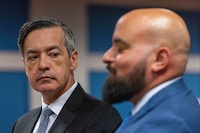It’s actually worse to overturn an election you know your side lost

Donald Trump wanted to make something very clear over the weekend: Attorney Sidney Powell, who last week pleaded guilty to charges filed against her in Fulton County, Ga., was not his attorney.
“Despite the Fake News reports to the contrary, and without even reaching out to ask the Trump Campaign, MS. POWELL WAS NOT MY ATTORNEY, AND NEVER WAS,” he wrote on his social media platform.
It’s a dubious claim, one that deserves the skepticism we should always apply to flat statements of fact from the former president. Powell was introduced with others as “representing President Trump” and “representing the Trump campaign” during the Rudy-Giuliani-hair-dye news conference in November 2020 and cited attorney-client protections in response to an inquiry from Axios a few months later. Reporting has indicated that Trump not only appreciated Powell’s efforts to elevate false claims about election fraud in the weeks after the election, but also considered appointing her as special counsel to conduct some sort of investigation.
What Powell did that was problematic for Trump was that she was embarrassing. Her performance at that news conference was bizarre. Her inability to present any evidence despite the friendly urgings of Fox News spurred the channel to publicly chastise her failure to do so. In November 2020, Giuliani distanced the campaign from her; yet less than a month later, Trump was flirting with that special counsel appointment.
Even in once again trying to keep Powell at arm’s length, Trump celebrated Powell’s (oddball) commitment to the idea that the election was stolen. She did these things — including the things to which she pleaded guilty — because she thought (with a complete dearth of justification) that the election had been inaccurately determined.
Contrast that with Kenneth Chesebro, another Trump lawyer who entered a guilty plea last week in Fulton County.
Over the weekend, his attorney, Scott Grubman, appeared on MSNBC to discuss the termination of the case against his client. Host Katie Phang noted that Chesebro had at one point been described as the “architect” of the effort to introduce alternate slates of electors in states Trump lost. Grubman disputed that, but also wanted to make another point clear.
“Mr. Chesebro never believed in the ‘big lie,’” he said of the false claim that Trump won the 2020 contest. “If you ask Mr. Chesebro today who won the 2020 election, he would say ‘Joe Biden.’”
In fact, Grubman argued, Chesebro was frustrated by the violence that erupted on Jan. 6, 2021, when pro-Trump rioters interrupted the counting of the electoral votes that would finalize Joe Biden’s victory.
“He said, ‘I wish there would have never been a rally,’” Grubman said. “‘I really wish that these folks wouldn’t have been violent, because it really took away from what we’ — Ken Chesebro and others — ‘were really trying to do from a legal standpoint.’”
This is hard to reconcile with Chesebro’s participation in the protest outside the U.S. Capitol, including his being seen moving around Capitol Hill in the vicinity of conspiracy theorist Alex Jones. (Grubman told Phang that Chesebro simply wanted a photo of Jones.)
But note that what Chesebro was “trying to do from a legal standpoint,” per Grubman, was shift the results of the 2020 election in favor of someone that he thought lost.
That is … not good.
Before Chesebro’s guilty plea, the New York Times reported that his communications with the Trump campaign and its agents were often centered less on achieving legal outcomes than achieving political ones. Of one filing, he wrote that the odds of a legal victory were about 1 in 100 but that it might offer some “possible political value.” In another message, he suggested that contesting the results in Wisconsin “gives more ammo to the justices fighting for the court to intervene” in the election results.
“I think the odds of action before Jan. 6 will become more favorable,” he continued, “if the justices start to fear that there will be ‘wild’ chaos on Jan. 6 unless they rule by then, either way.”
Before that day, then, the prospect of unrest in Washington might prove a useful incentive to get justices to try to resolve questions in Trump’s favor. But when the unrest unfolded, it apparently became an impediment to the effort to wrench the presidency from its actual winner.
Thanks to their having requested expedited trials, it seemed for a bit as though both Trump-adjacent lawyers would be fighting their cases in a Fulton County courtroom at the same time.
It would have presented a remarkable contrast. There was the lawyer whose evidence-free beliefs about the 2020 contest spurred her to fight the results, whose eventual distance from Trump was driven by her eccentric claims, not that the claims were false. Then there was the lawyer who remained part of the Trump legal team, who didn’t think the election was stolen but tried his best to keep Biden out of the White House anyway.
Which of those actors is more problematic for the democratic system?


